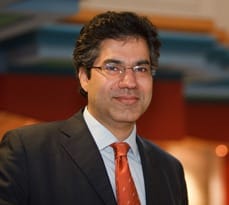
Islamic finance has a great future and the British government’s move to launch an Islamic bond is very welcome news for the fast-growing sector, says Dr Kamal Munir, Reader in Strategy & Policy at Cambridge Judge Business School.
Launching a new Cambridge Judge Business School Islamic Finance programme, Dr Munir says Islamic finance offers a more stable platform through the constraints within which it operates but also because an increasing number of people are appreciating its benefits.
An additional factor is that costs around Islamic finance are tumbling.
“The costs tended to be higher in Islamic banks because of all the hoops they had to jump through. The costs are rapidly coming down as more and more standardisation takes place. All of these things make me think the future for Islamic finance is quite bright.”
Dr Munir, an acknowledged leader in the field, thinks Prime Minister David Cameron’s move to issue an Islamic bond is welcome news for the industry.
“First of all, it really helps the UK industry because there is massive liquidity in Islamic institutions that they will be able to tap into. That can finance infrastructure projects and other things.
“Secondly, Islamic institutions themselves have been looking for triple-A assets to buy, and this gives them an ideal way forward. Of course, third, London cannot afford to stay out of this game if it to stay capital of finance.”
Dr Munir’s programme, to be delivered in London and Dubai, begins with a definition of Islamic finance and moves into the way it compliments conventional finance products.
There is a major focus on ‘risk’ and how it differs from conventional – a critical area for Islamic finance where a number of real assets have to be managed through strict risk protocols.
The programme also examines the strategic challenges facing Islamic banks in both their existing markets and those into which they want to expand.
It is aimed at a broad cross-section, from bankers involved in both conventional and Islamic banking, to fund and wealth managers, lawyers and regulators or those either new to or intending to work in the Islamic finance sector.


